EV Charger Selection Guide|Types, Specifications & Installation Cost Overview
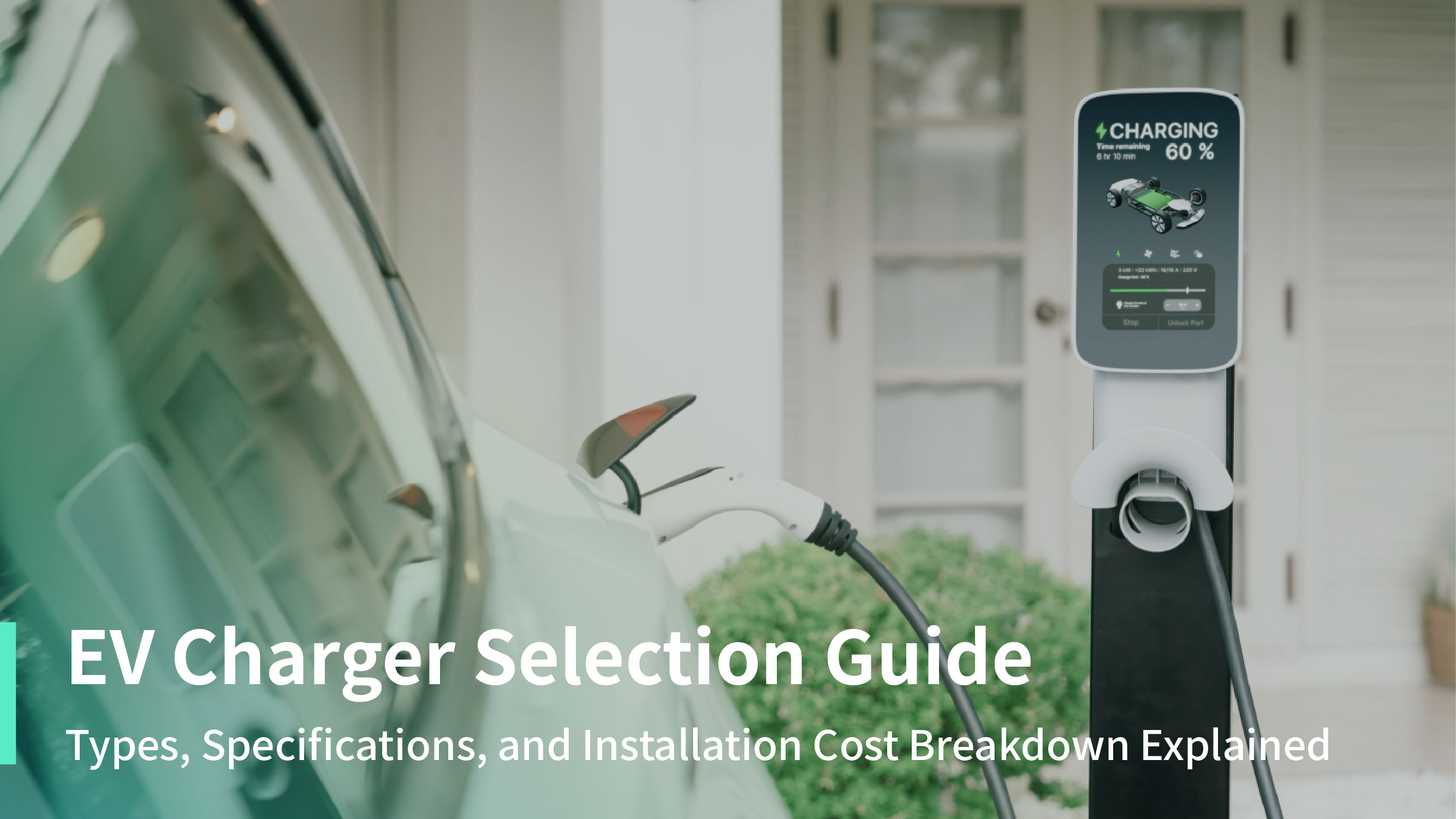
Curious about EV chargers? Learn about types, specs, installation costs, subsidies, and how to choose the right one. Discover expert solutions with eTreego.
1. What Is an EV Charger? Types of EV Chargers Explained
(1) What Is an EV Charger?
An EV charger is a device that supplies electric power to recharge electric vehicles, including Battery Electric Vehicles (BEVs) and Plug-in Hybrid Electric Vehicles (PHEVs).
According to Taiwan’s Ministry of Transportation, as of the end of November 2024, there are 92,156 registered electric passenger cars in Taiwan, with 10,086 public charging connectors available—resulting in a charger-to-vehicle ratio of approximately 1:9.1.
As EV adoption continues to grow, many EV owners are also installing home EV chargers to make daily charging more convenient.
(2) Two Main Types of EV Chargers: AC vs. DC Explained
EV chargers are generally classified into two types based on the type of current they provide: AC (Alternating Current) and DC (Direct Current) chargers.
A. AC Chargers
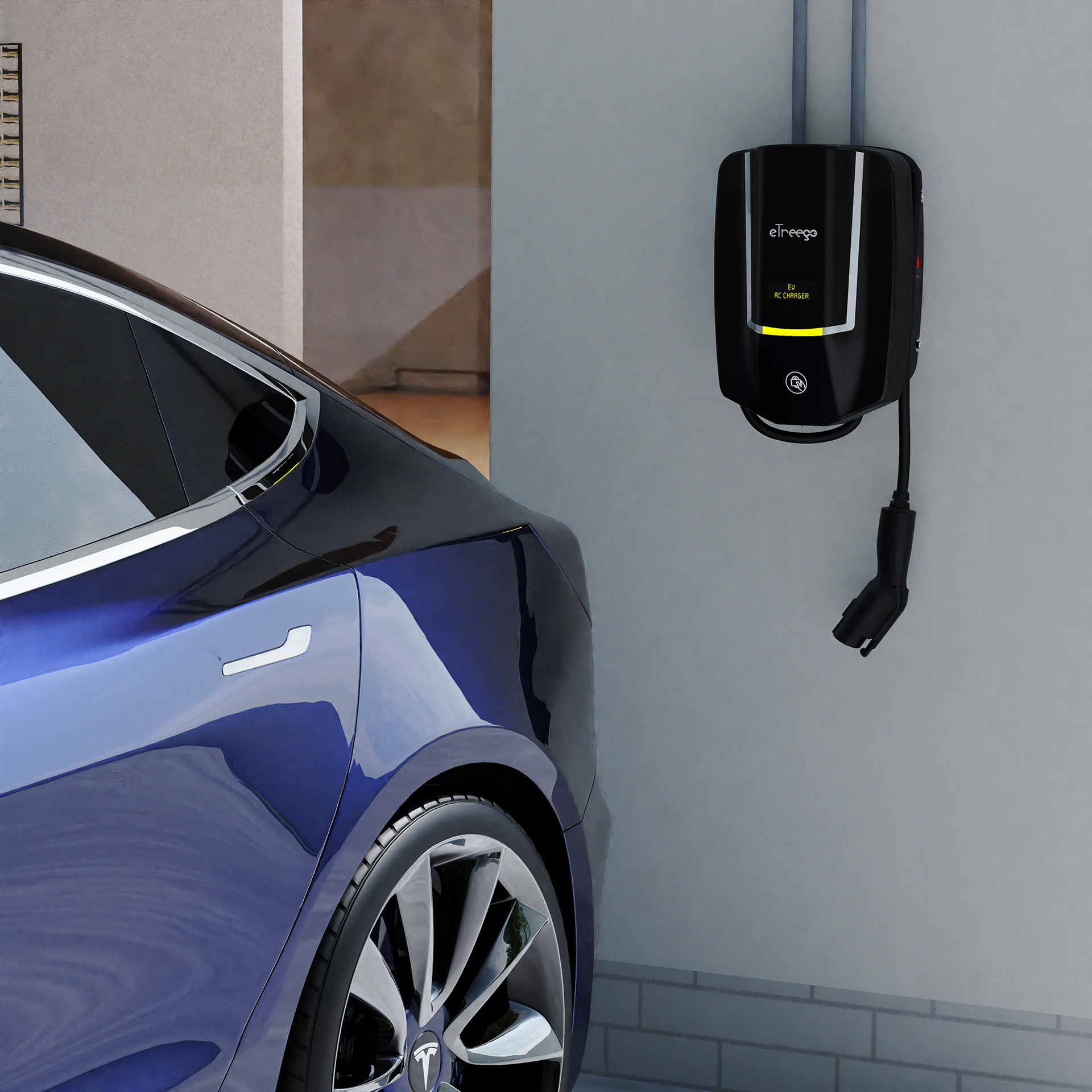
AC chargers, also known as slow chargers or alternating current (AC) chargers, these EV chargers offer lower power output and take approximately 6 to 12 hours to fully charge a vehicle. Despite the slower charging speed, they are cost-effective and ideal for home installations, making them a popular choice for residential users.
AC chargers are also suitable for locations where vehicles are parked for extended periods, such as hotels, shopping malls, and office parking lots, allowing drivers to conveniently charge while working, shopping, or staying overnight.
B. DC Chargers
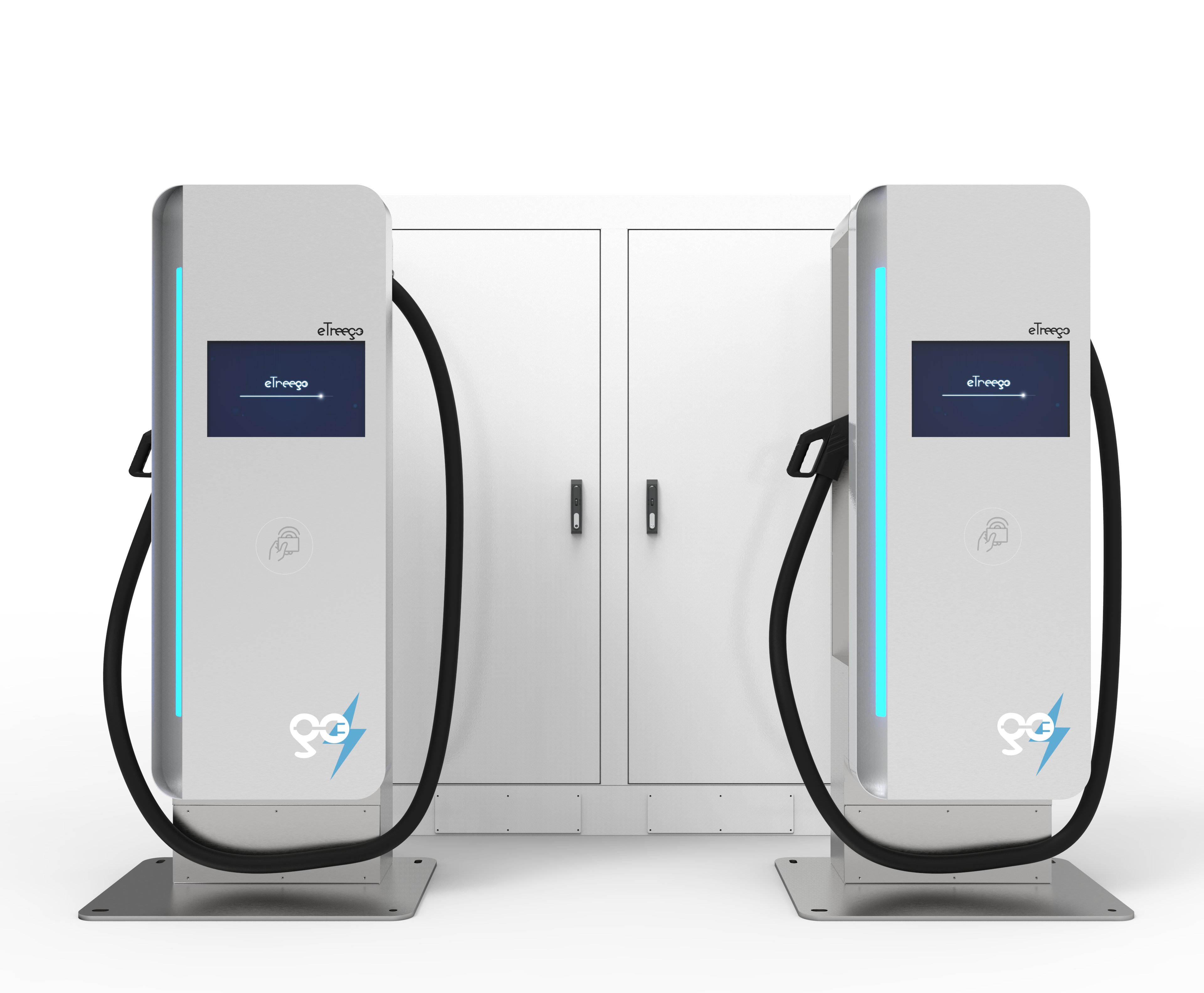
DC chargers, also known as fast chargers or direct current (DC) chargers, deliver high power output, enabling much faster charging compared to AC chargers. On average, they can charge an electric vehicle up to 80% in just 20–30 minutes.
Thanks to their rapid charging capabilities, DC chargers are ideal for high-traffic locations such as rest stops, gas stations, highway interchanges, and other commercial areas where electric vehicles need to quickly recharge.
Some parking facilities are also equipped with compact DC fast chargers, allowing everyday EV users to enjoy a quick and efficient charging experience.
Want to learn more about EV charger details?
Find all the information you need at eTreego!
2. How to Choose the Right EV Charger? A Guide to Common EV Charger Specifications
(1) EV Charger Specifications Overview
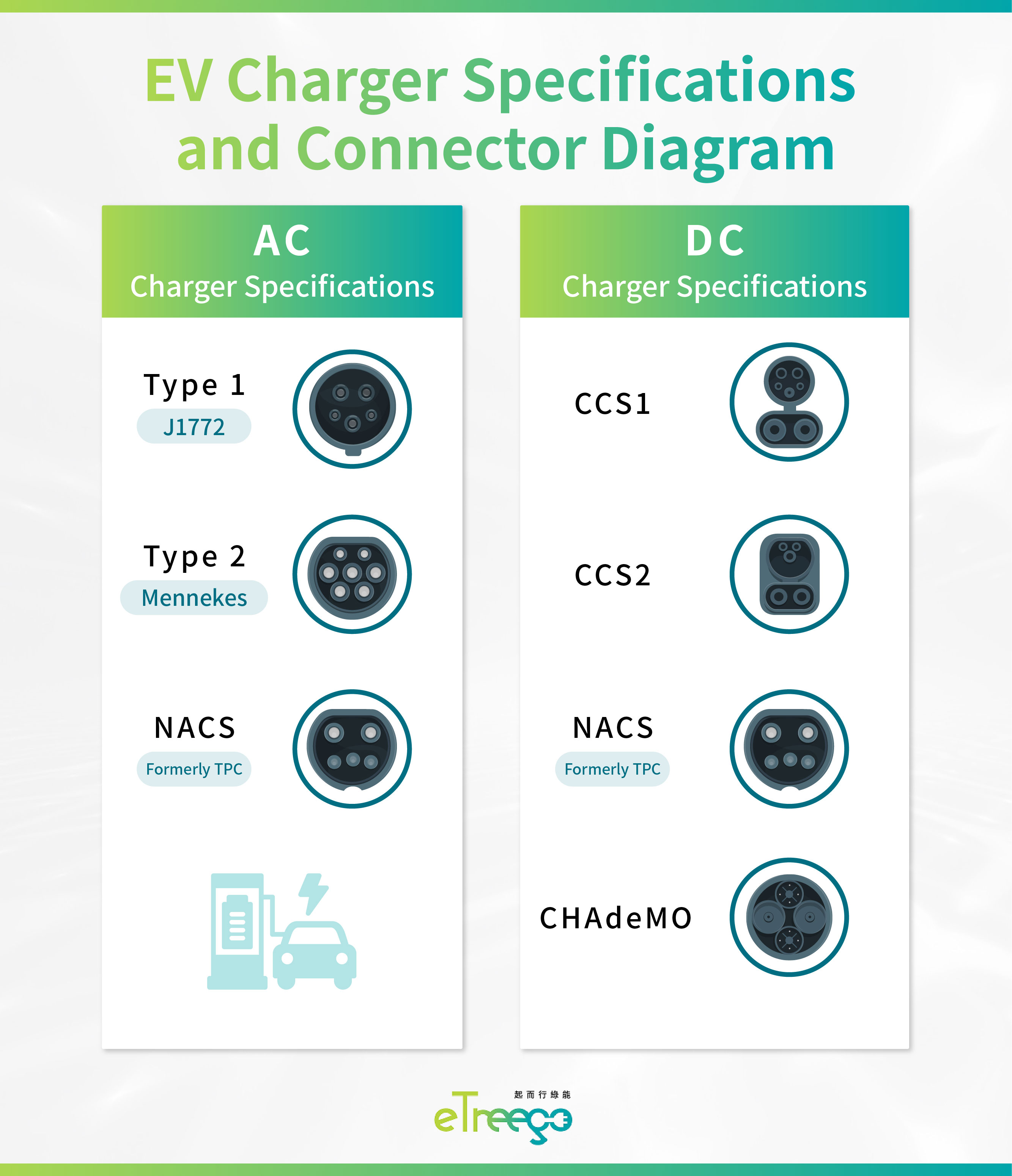
(1) EV Charger Specifications Overview
AC EV chargers generally come in the following three types:
- Type 1(J1772)
This North American standard delivers 3.7 to 19.2 kW of charging power, with a charging rate of around 7 kWh per hour. It is currently the most widely compatible type in Taiwan. - Type 2(Mennekes)
This European standard supports 3.7 to 22 kW charging power, offering up to 20 kWh per hour. - NACS(原 TPC)
Originally Tesla’s proprietary connector, NACS is now available to third-party manufacturers. It integrates both AC and DC charging, with a charging power range of 7.2 to 22 kW.
B. DC EV Charger Specifications
DC EV chargers are categorized into the following four main types:
- CCS1
A North American standard, typically offering up to 350 kW of charging power. It is compatible with J1772 for AC charging. - CCS2
A European standard, also commonly supporting up to 350 kW. It pairs with Mennekes for AC charging. - NACS(formerly TPC)
As mentioned above, this connector supports both AC and DC charging with a single interface. - CHAdeMO
A Japanese standard that supports 200–1,000V voltage. According to the latest CHAdeMO 3.0 specification, it can theoretically deliver up to 500A and 500 kW of output.
However, most Japanese EVs like the Nissan Leaf and Mitsubishi i-MiEV still use earlier versions of CHAdeMO, typically supporting 50–100 kW. Due to lower adoption in Taiwan, this standard is less commonly used.
(2) How to Choose the Right EV Charger? 4 Key Factors to Consider
Looking to install an EV charger but not sure how to choose among so many options? Here are 4 key selection tips to help you make the right decision.
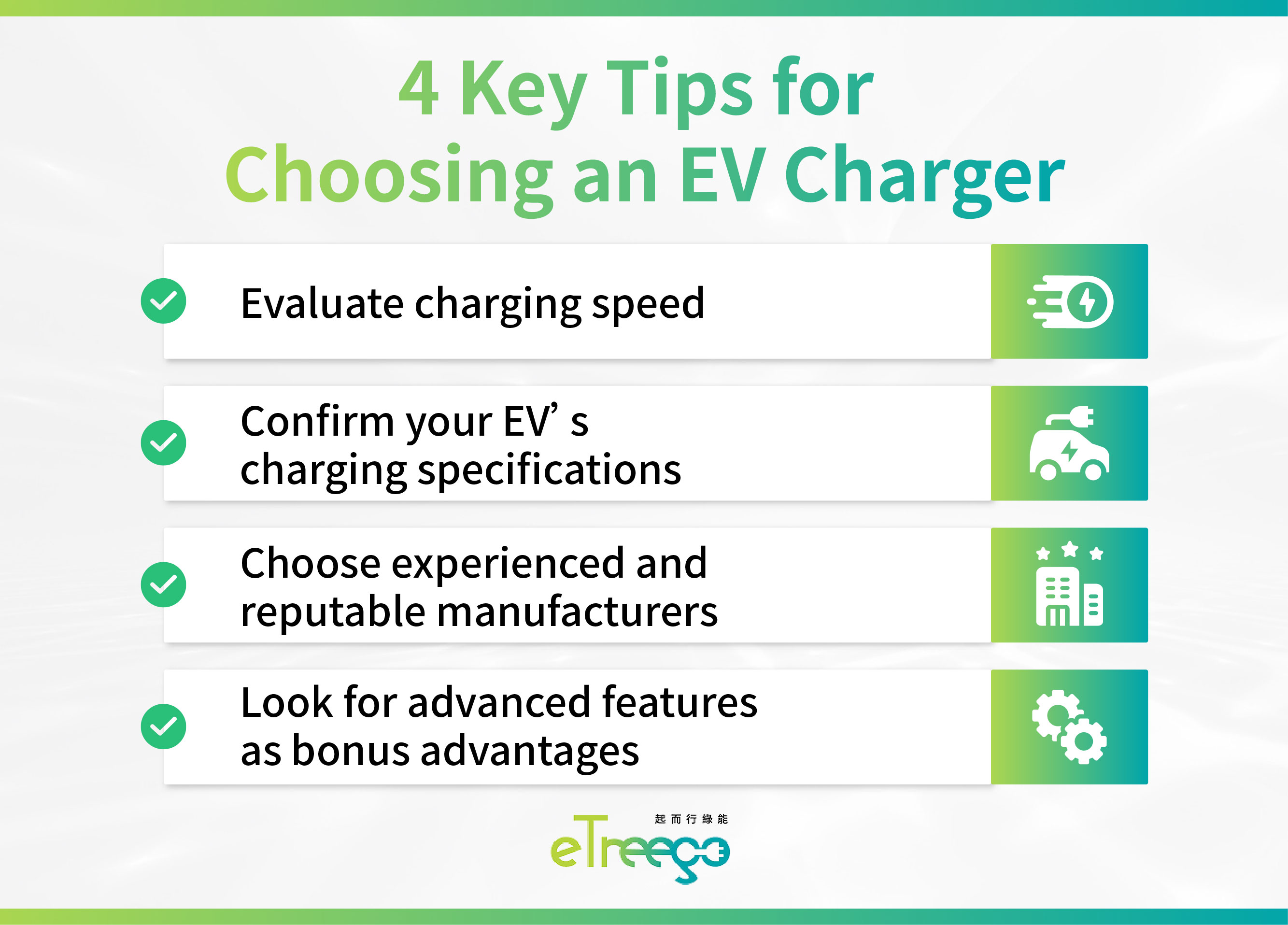
- Determine the Charging Speed: For residential use, AC slow chargers are more budget-friendly and commonly chosen. However, if faster charging is desired, a compact DC fast charger is also a viable option.
- Confirm Your EV’s Charging Specifications: Before purchasing, check your EV's maximum supported charging power and connector type to ensure compatibility with the charger.
- Choose an Experienced and Reliable Manufacturer: Select a provider with a strong track record in EV charger design and installation. Proven expertise ensures better product quality and after-sales support.
- Advanced Features Are a Plus: Some EV chargers offer smart features like app-based remote control and real-time monitoring, making charging more convenient and user-friendly.
How to choose a high-quality EV charger? Find out more at eTreego!
3. What Should You Know About EV Charger Installation? Home Charger Installation Costs Explained
(1) Key Considerations for Installing an EV Charger
When installing an EV charger, be sure to keep the following in mind:
- Stable Power Supply: Not all locations are suitable for EV charger installation. It's best to consult professional installers to assess the site and confirm a stable power supply before proceeding.
- Choose the Right Mounting Type: EV chargers come in wall-mounted and pedestal-mounted options. Wall-mounted chargers are compact and ideal for garages or indoor parking walls. Pedestal chargers are larger and best suited for outdoor spaces like surface parking lots.
- Community Charger Installation Requires Approval: Installing shared chargers in residential communities requires consent from residents, the homeowners’ association, and property management.
- Taiwan Power Company Approval: After installation, the installer must submit a completion report to Taipower for inspection. Only after approval can the charger be officially used.
(2) How Are Home EV Charger Installation Costs Calculated? Are Subsidies Available?
Installing a home EV charger involves several cost components. Here’s a breakdown:
- Site Survey Fee: A service fee for professional assessment of the installation site.
- Equipment & Materials: Includes the charger unit, cables, connectors, and communication modules. Costs vary by brand and charger model.
- Installation Labor: Complex sites or building structures can increase labor costs.
- System Configuration Fee: Covers EMS (Energy Management System) setup and charger configuration.
- Completion Filing Fee: Charged by the installer for handling paperwork and submission to Taipower. Pricing varies by provider.
The Taiwanese government offers subsidies for community EV charger installations. If you're a community resident and obtain proper approval from the HOA and property managers, you may apply for grants to reduce your costs.
Here are direct links to regional subsidy programs:
- Taipei: EV Charger Subsidy Guidelines for Apartment Buildings in Taipei City
- New Taipei: 2025 Low-Carbon Community Retrofit Subsidy Program
- Taoyuan: 2025 Apartment Building Maintenance Subsidy Plan
- Taichung: Public Charger Subsidy Program by Taichung City Government
- Chiayi: EV Charging Infrastructure Subsidy Plan for 2025
- Kaohsiung:Smart Home Subsidy Plan by Public Works Bureau (for reference)
4. Do EV Chargers Have Brand Limitations? Maintenance & Other Common Questions (FAQ)
(1) Do Home AC Chargers Require Regular Maintenance?
Yes — regular maintenance helps ensure safe and stable operation. We recommend a full inspection once or twice a year.
In addition, routine self-checks every quarter — such as inspecting cables and connectors for wear, debris, or abnormalities — can extend the lifespan of your charger and ensure optimal safety.
(2) How Are Home EV Chargers Powered and Billed?
This depends on the type of residence:
- Standalone Homes: The charger is connected from the household circuit breaker. Installation costs are borne by the homeowner, and electricity usage is billed under the home’s existing utility account.
- Apartment or Community Housing: Chargers are typically installed with dedicated electricity meters and integrated with EMS (Energy Management Systems). Installation costs are shared among residents, while users are billed separately for their individual charging sessions.
5. Which EV Charger Should You Choose? Discover Smarter Charging Solutions with eTreego
A home EV charger makes charging simple and stress-free — just plug in when you get home, and wake up to a fully charged vehicle. But where can you find a reliable, high-quality charger? Let eTreego be your trusted partner.
At eTreego, we offer a carefully curated selection of high-performance EV chargers, designed to meet diverse user needs. Here's what sets us apart:
- Expert Technical Team: Backed by years of EV industry experience, our team specializes in charging systems, motor control, vehicle control, and battery management.
- Comprehensive Charging Solutions: We provide integrated charging equipment and smart management systems for 2-wheel, 4-wheel, and 8-wheel EVs, tailored to various application scenarios.
- Strong Industry Partnerships: Collaborating with top players like Shihlin Electric and Hotai Motor, we deliver solutions that ensure superior quality, performance, and after-sales support.
Whether you're looking for AC or DC chargers, for residential or commercial use, you'll find the right fit at eTreego.
Visit our official website to explore our full range of EV charging solutions and find the product that best suits your needs — because every journey deserves a smooth, reliable start.
Reliable and Professional EV Chargers – eTreego